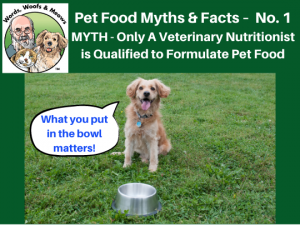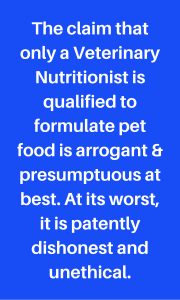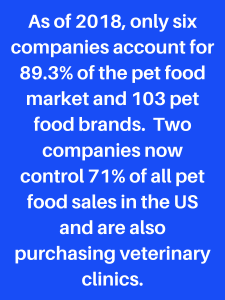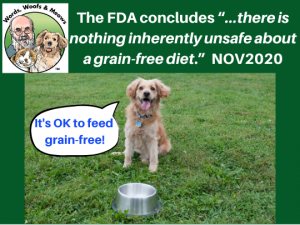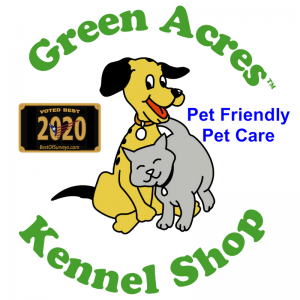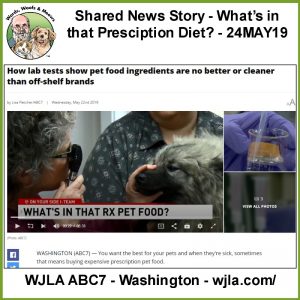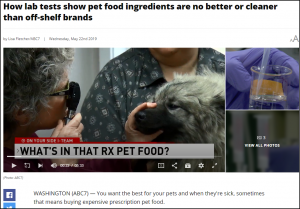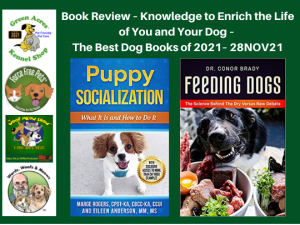 < A version of this article was published in the December 2021 issue of Downeast Dog News>
< A version of this article was published in the December 2021 issue of Downeast Dog News>
< Updated 15NOV21 >
< A short link for this page – https://bit.ly/BkRvwNOV2021 >
It’s the holiday season and a time when we often think about giving gifts to others. The greatest gift my parents gave me was a love of reading and a thirst for knowledge. It was a gift given out of love, knowing that it had the potential to benefit not only me but those around me. I believe it was the greatest gift I have ever received. It has nurtured my life-long love of learning, a character trait essential for any professional. What we have learned about dogs and cats in the last 30 years is amazing, and if you haven’t been keeping up, you are out of date as much of what we thought we knew has been proven incomplete or wrong.
for knowledge. It was a gift given out of love, knowing that it had the potential to benefit not only me but those around me. I believe it was the greatest gift I have ever received. It has nurtured my life-long love of learning, a character trait essential for any professional. What we have learned about dogs and cats in the last 30 years is amazing, and if you haven’t been keeping up, you are out of date as much of what we thought we knew has been proven incomplete or wrong.
As you may know, I often write about my favorite dog book of the year in December. This year I am highlighting two books whose content can help enrich the lives of you and your dog.
Puppy Socialization: What It Is and How to Do It by Marge Rogers and Eileen Anderson contains knowledge essential to anyone who works with puppies, has a 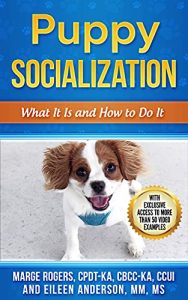 puppy, or is contemplating getting a puppy. It is available as a paperback or in multiple e-book formats. It is available as a paperback or in multiple e-book formats.
puppy, or is contemplating getting a puppy. It is available as a paperback or in multiple e-book formats. It is available as a paperback or in multiple e-book formats.
The concept of puppy socialization was extensively researched at Maine’s own Jackson Laboratory for 20 years, culminating in the publication of Genetics and the Social Behavior of the Dog by Scott and Fuller in 1965. Yet, 47 years later, too many in the dog world still do not understand the essential basics of puppy socialization. For example, it has a specific endpoint (12 to 16 weeks of age), it is as important as vaccinations, it doesn’t happen by accident but requires careful planning, it involves meeting more than the neighbors and their dog, it means creating a positive association with new things, requires you to advocate for what is best for your puppy, and is essential for normal social development.
As a canine behavior consultant, I assist people with dogs with deep-seated anxiety and often anti-social behavior that is likely the result of inappropriate or inadequate socialization during the critical period. This debilitating mental illness might have been prevented had the person caring for the dog understood puppy socialization. Reading and following the precepts in Puppy Socialization: What It Is and How to Do It might prevent you from ever needing the services of a canine behavior consultant or veterinary behaviorist.
Rogers and Anderson’s book will teach those who read it what they need to know to socialize their puppy, thus helping them have a great life together. In addition to the easy-to-read text and beautiful photographs, the book includes links to over 50 online videos. Note, it is easiest to access those videos and other online resources from one of the e-book editions.
to socialize their puppy, thus helping them have a great life together. In addition to the easy-to-read text and beautiful photographs, the book includes links to over 50 online videos. Note, it is easiest to access those videos and other online resources from one of the e-book editions.
I am so impressed by Puppy Socialization: What It Is and How to Do It that I am: 1) making it required reading for all Green Acres Kennel Shop staff, 2) incorporating it into the curriculum for my ForceFreePets.com online Puppy Headstart class, 3) will be including copies for all students in that class starting January 1st, and 4) will be gifting the book to several veterinary colleagues so that they may share it with their staff after reading it themselves.
Feeding Dogs. Dry or Raw? The Science Behind The Debate by Conor Brady, PhD. will hopefully end the debate over how to feed our dogs for optimum 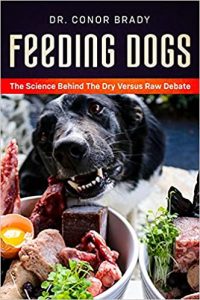 health. Dr. Brady spent 10-years examining what the scientific literature tells us about canine nutrition answering such questions as: is the dog a carnivore or omnivore, what are the problems with feeding kibble, why are so many people pro-kibble and anti-fresh food despite evidence to the contrary, and how to feed a dog a species-appropriate diet for optimal health. In addition, you will find a comprehensive reference list to the peer-reviewed scientific research supporting the author’s conclusions at the end of each section.
health. Dr. Brady spent 10-years examining what the scientific literature tells us about canine nutrition answering such questions as: is the dog a carnivore or omnivore, what are the problems with feeding kibble, why are so many people pro-kibble and anti-fresh food despite evidence to the contrary, and how to feed a dog a species-appropriate diet for optimal health. In addition, you will find a comprehensive reference list to the peer-reviewed scientific research supporting the author’s conclusions at the end of each section.
Available as a hardcover book or four e-books, Brady’s Feeding Dogs is worth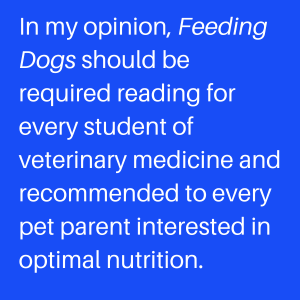 every penny for those who understand that proper nutrition is the foundation of physical, mental, and emotional health. In my opinion, Feeding Dogs should be required reading for every student of veterinary medicine and recommended to every pet parent interested in optimal nutrition.
every penny for those who understand that proper nutrition is the foundation of physical, mental, and emotional health. In my opinion, Feeding Dogs should be required reading for every student of veterinary medicine and recommended to every pet parent interested in optimal nutrition.
If you want to learn more about Feeding Dogs and Dr. Brady before reading the book, I encourage you to listen to this 40-minute interview at https://bit.ly/IntvwDrConorBradyFeedingDogs
No matter which winter holidays you celebrate, I wish you and your pet happy holidays and a great 2022.
Recommended Resources
Articles on Don’s Blog
( http://www.words-woofs-meows.com )
Puppy Essentials 101- Body Language & Socialization – https://bit.ly/BHS-SocBdyLang
Essential Handouts On Body Language, and Canine and Human Behavior from Dr. Sophia YinPuppy – https://bit.ly/YinBodyLang
Socialization and Habituation – http://bit.ly/SocializationPuppy
How Can I Tell When My Dog Is Anxious or Fearful? – http://bit.ly/DogsSignsofFear
Especially for New Puppy Parents – http://bit.ly/EspcNewPuppyParents
Alone Training – http://bit.ly/AloneTraining
Which Companies Are Behind Your Pet’s Food? – http://bit.ly/PetFoodComp
What I Feed My Dog and Why I Feed What I Do – https://bit.ly/WhatIFeedAndWhy
Pet Food Myths & Facts – No. 1, MYTH – Only a Board-Certified Veterinary Nutritionist is qualified to formulate pet food – http://bit.ly/PetFoodMyths-Facts-4MAR21
Pet Nutrition Facts – Do You Want Optimal Nutrition, Low Cost, or Convenience? You CANNOT Have It All – http://bit.ly/PetNut-Opt-Cost-Con
 Podcasts from The Woof Meow Show
Podcasts from The Woof Meow Show
( http://woofmeowshow.libsyn.com/ )
Podcast – Especially for New Puppy Parents – Part 1 – http://bit.ly/WfMw-Esp_Pups1
Podcast – Especially for New Puppy Parents – Part 2 – http://bit.ly/WfMw-Esp_Pups2
Podcast – Especially for New Puppy Parents – Part 3 – http://bit.ly/WfMw-Esp_Pups3
Don Hanson and Dr. Dave Cloutier on Puppy Socialization and Vaccination – http://traffic.libsyn.com/woofmeowshow/Pet_Tip_-Don_Hanson_and_Dr._Dave_Cloutier_on_Puppy_Socialization_and_Vaccinations.mp3
Podcast – What We Feed Our Pets and Why, with – Don Hanson, Kate Dutra, and Linda Case – https://bit.ly/WfMw-WhatWeFeed-11JUL20
Podcasts-Two Conversations with Animal Nutritionist Dr. Richard Patton – https://bit.ly/WfMw2wPattonAPR21
________________________________________________________________________
Don Hanson is the co-owner of the Green Acres Kennel Shop ( greenacreskennel.com ) in Bangor, Maine, where he has been helping people with their pets since 1995. He is also the founder of ForceFreePets.com, an online educational resource for people with dogs and cats. Don is a Bach Foundation Registered Animal Practitioner (BFRAP), Certified Dog Behavior Consultant (CDBC), Associate Certified Cat Behavior Consultant (ACCBC), and a Certified Professional Dog Trainer (CPDT-KA). He is a member of the Pet Professional Guild (PPG). Don is committed to PPG’s Guiding Principles and the Pain-Free, Force-Free, and Fear-Free training, management, and care of all pets. He serves on the PPG Steering Committee and Advocacy Committee and is the Chair of The Shock-Free Coalition ( shockfree.org ). Don produces and co-hosts a weekly radio show and podcast, The Woof Meow Show, that airs on Z62 Retro Radio WZON (AM620) and WKIT 103.3-HD3 streamed at http://bit.ly/AM620-WZON every Saturday at 9 AM. Podcasts of the show are available at http://bit.ly/WfMwPodcasts/, the Apple Podcast app, and Don’s blog: www.words-woofs-meows.com. The opinions in this post are those of Don Hanson.
©28NOV21, Donald J. Hanson, All Rights Reserved
< Click for Copyright and Use Policy >
